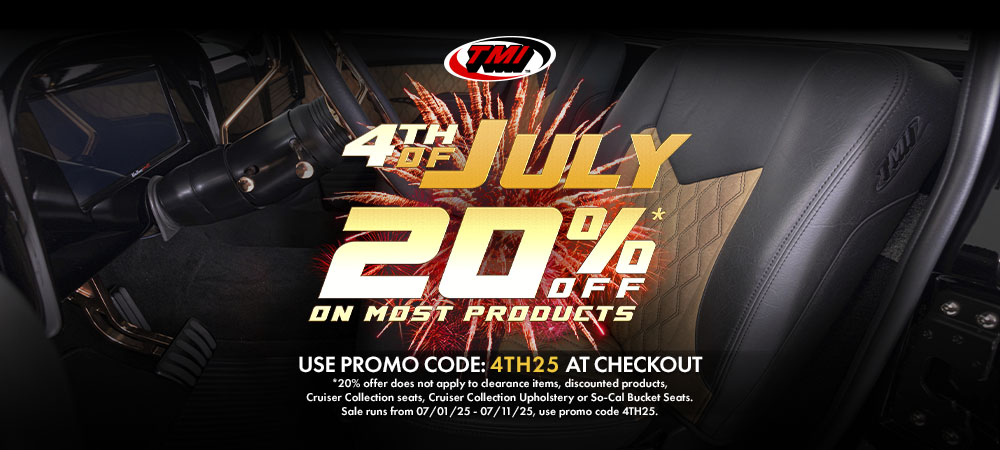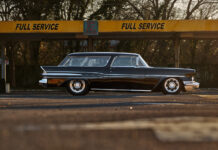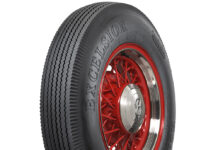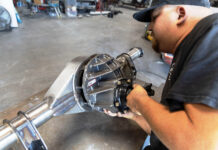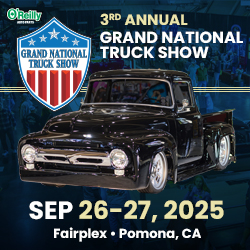Tom’s “Advance Design” Chevrolet 3100 Hot Rod
By Gary Rosier – Photography By the Author
The early trucks of 1947-55 were known as the Chevy Advance Design series. The war was over and GM felt the need to redesign the truck models into a bolder, stronger, up-to-date look with bigger platforms compared to the previous AK Series trucks. Postwar demand fueled the changes to keep up with businesses that were booming and wanted more room with a bigger payload capability.

Fast-forward to 2023 and to Tom Taxon’s beautiful 1950 Chevrolet 3100 series pickup. No stranger to building his own cars, as he owns a cool 1956 Olds Rocket 88, a 1932 Ford Roadster, and 1940 Ford coupe. By trade he is a fabricator/tool and die maker and loves building and working on his own rides. Tom did almost all the work on the pickup, some chassis modifications for the fuel tank mounting, as well as exhaust, wiring, plumbing, and he also shared in the tedious final reassembly.

Tom started out as a tool and die maker early in his work life, migrating into mechanical engineering and production management at a small manufacturing company. Over the years, Tom managed a sheet metal fabrication company, then joined a video and arcade game startup in the late ’70s. He joined an engineering consulting firm in 1983, and in 1989 moved to Bally Technologies. There he worked as vice president of hardware engineering for 18 of 21 years until retirement in 2010. So, you know the skill level was there to tackle such a project as this.

It all started after Tom saw an old red 1949 Chevrolet 3100 pickup at a car show several years ago (2016) in Daytona Beach. It had a For Sale sign on it and when he inquired about it the owner said it had some mechanical bugs (bad head gasket for one) that the owner would fix before selling it. He chased that one for about a month, gave up, and decided to jump in and just build what he wanted from scratch. He has built a few street rods after all and with his engineering and building experience, why not?

Read More: Bob Bauder’s Last Build: ‘32 Ford Pickup
Tom started with the basics, such as the frame, engine, transmission, suspension, and brakes from Art Morrison Chassis. Not one to mess around, he started with fresh parts gathered, fitted, and planned to create a better foundation for his 1950 Chevy pickup.

After many attempts to get the front end, hood, fenders, grille, headlights, and front roll pan all fitted properly he decided “half of being smart is knowing what you’re dumb at,” so he enlisted Jeff’s Restorations in Holly Hill, Florida, to help him out. Although he had painted a few cars in the past, he felt that this one was special and needed a professional touch. They had done some projects previously for Tom and did amazing work.

Body parts, cab, fenders, grille, hood, bedsides, and tailgate were a mix of old and parts. Original parts, if he didn’t have them already, or were too far gone to reuse, were sourced from all over. Swap meets, online shopping, car shows, as well as more reproduction parts were purchased from an array of suppliers/vendors over a span of about four years. Total build time was six years.

Mar-K bedsides, tailgate, and front panels were modified by Tom to be able to raise the bed floor 2 inches. Dan Carpenter wheel tubs were then modified and installed by Tom. The bed floor is a Smokey Road Shop laminated aluminum floor. Another modification was to integrate 1939 Lincoln taillights to the end of the bedsides. He chuckles that he has two Chevy motors in his two Fords so he thought it wouldn’t hurt to have a little Ford stuff on his Chevy.

Read More: 2024 Barrett-Jackson Cup Top Five Finalist Revealed – 1967 Chevy Pickup
The cab was a challenge with considerable effort placed into smoothing the firewall. Firewall mods were made to smooth the overall surface and change the recesses to accommodate the LS3 engine. The dash was also modified and is now fitted with AC vents. The glovebox and door were removed, smoothed over, now allowing the Vintage Air Gen IV AC unit to be mounted up and out of the way. A double-DIN radio head was also integrated at this time, which provides for cool sounds, a rearview camera, GPS, and other usable features. The signature features of the dash are the VHX Dakota Digital gauges. Remember, Tom did all the hands-on work himself in his well-appointed shop. Tom tells us, “It was tedious but fun.”

The bucket seats were from a wrecked ’18 Nissan placed on hinged seat risers that allow access underneath to the ECM and Ron Francis fuse panel. Tom cut the seats down some 3 inches to keep each of the seat backs below the rear window. He also built a custom center console that houses a Lokar floor shifter.

Tom was also instrumental in the design of the interior. He loves double-stitched diamond patterns and while he can’t sew he did the door panels and aspects of the interior. The foundation for the headliner is a piece of ABS vacuum formed but then trimmed to fit. He did all the final trimwork. Del Lyons, of The Upholstery Man shop in South Daytona, is responsible for the final stitchwork you see throughout.
Tom commented that while a six-speed was initially planned, the change to a 6L80E transmission would add to the truck’s overall ease of driving.

Door modifications included the Kindig It Design recessed door handles. The linkage to the bear claw latches was interesting, but Tom did enjoy making the intricate design.
The paint comes from the PPG Vibrance line in Nutmeg. Tom wanted to share that Dave Clark was his point man on the project and did a top-notch job on the truck. Doors, hood, fender fitment, Hagan recessed light installation, and gaps are spot-on. The attention to detail was all part of Tom’s Chevy Advanced Design concept coming together nicely. Jeff Saldino, owner of Jeff’s Restorations, suggested reversing out the “Chevrolet” on the tailgate for a different look.

Read More: Hemi Swapped 1932 Ford Roadster
Other notables in the build are Michelin Pilot Sport A/S plus 275/R18 run flats on all four corners mounted on a set of Custom Torq Thrust American Racing wheels (18×9.5 with 6-inch in front and 5-inch offset in the rear). It stops via Wilwood brake kit including 13-inch drilled-and-slotted rotors with six-piston fronts and four-piston rear calipers and a Wilwood master cylinder.

It’s powered by a Chevrolet 376 LS crate engine prepared with a March Performance LS Pro Track serpentine system finished in black and Art Morrison Enterprises headers. The keystone to this truck’s underpinnings is a GT Sport Art Morrison Enterprises chassis. The chassis components are more Art Morrison Enterprises, such as the coilovers, front and rear sway bars, and a four-link and Ford 9 inch rear end with Tru-Trac limited-slip 3.50 gears and Strange 31-spline axles. Exhaust is channeled out through a 2-1/2-inch stainless steel exhaust with Performance MagnaFlow mufflers. He added electric exhaust cutouts for a bit of fun.

It gets its “go” juice from a Rick’s Hot Rods 17-gallon capacity tank specifically designed to work with the Art Morrison Enterprises chassis. He had to modify it still to allow its removal from underneath. This would allow easier access to the fuel pump, fuel sending unit, or the tank itself, if needed.
















